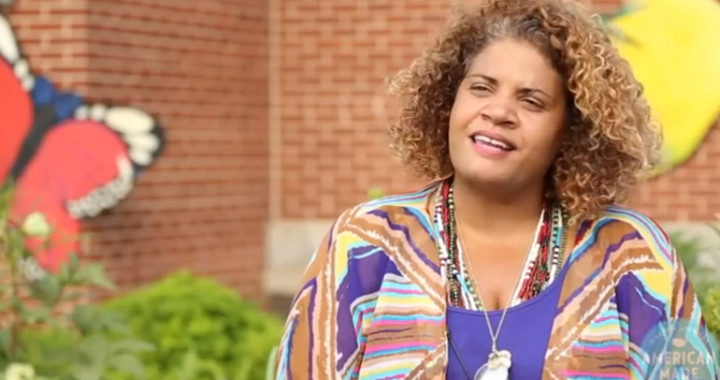On Jan. 20, a roomful of college students and citizens gathered at UNC Asheville’s Highsmith University Union to hear Growing Power‘s national projects director, Erika Allen, discuss food systems, urban farms and sustainability. She focused on “transformation through the food system.”
Allen launched into a dialogue on how the concept of social justice is entwined with food, and she encouraged people to take action, saying, “I want you all to think big about what to do.” Her presentation was part of UNCA’s Key Center Social Justice Coffee Hour series, and Growing Power, a national nonprofit and land trust, works to “provide equal access to healthy, high-quality, safe and affordable food for people in all communities.”
“No matter what your cultural, educational or economic level, we come in and see how things come together — how things work,” Allen said. Growing Power diverts landfill material and turns it into compost, educates people and communities about growing styles and systems, trains people through its regional outreach programs, partners with other organizations and mentors young people, she explained. All are “things that can be done to envision a different kind of food system.”
The essence of Growing Power’s operations is to reclaim public spaces for urban farms. In so doing, community ties are strengthened, and food, jobs and income are produced, Allen explained. Although her organization is based in Chicago, it has partnered with like-minded groups across the country and the globe. “The future of the farm includes multi-use buildings with offices, domestic areas … something that makes sense with the landscape,” Allen said.
Allen emphasized Growing Power’s youth mentorship programs as well as its workshops. She talked about “engaging youth” in Chicago through art therapy and providing them with a “safe space” to express themselves. Allen also said, “The practicality of the workshops is transformative.”
Moreover, Allen talked about how the programs that her organization offered could be profitable. Growing Power sells the abundance of its produce at farmer’s markets, Allen said. “It’s an exchange of resources — we share with you, and you share with us,” she said.
In closing, Allen encouraged the proliferation of Local Empowerment Groups. “I would love to see a LEG in Asheville,” she said. “The most important part of this work is just bringing different types of people together and building a cohesive vision.”
Upcoming events this semester at UNC Asheville include:
- Resilient Agriculture: Cultivating Food Systems for a Changing Climate, with Laura Lengnick, author and professor of sustainable agriculture and environmental studies at Warren Wilson College, at 7 p.m. on Monday, Jan. 26 in the Sherrill Center, Mission Health Systems Mountain View Conference Room.
- Developing, Implementing and Sustaining a Food Assistance Incentive Program for Farmers’ Markets: Lessons Learned in South Carolina, with Darcy Freedman, associate professor at Case Western Reserve University and core faculty of the Prevention Research Center for Healthy Neighborhoods, at 7 p.m. on Tuesday, March 31, in the Sherrill Center, Mission Health Systems Mountain View Conference Room.




Before you comment
The comments section is here to provide a platform for civil dialogue on the issues we face together as a local community. Xpress is committed to offering this platform for all voices, but when the tone of the discussion gets nasty or strays off topic, we believe many people choose not to participate. Xpress editors are determined to moderate comments to ensure a constructive interchange is maintained. All comments judged not to be in keeping with the spirit of civil discourse will be removed and repeat violators will be banned. See here for our terms of service. Thank you for being part of this effort to promote respectful discussion.